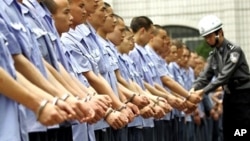China has outlawed the use of torture to obtain evidence in criminal prosecutions. While rights activists welcome the news, they are concerned the move is aimed at easing public anger over a high-profile wrongful conviction case.
The Chinese government announced the ban following national outrage over a farmer who spent a decade in prison for a murder he did not commit. Zhao Zuohai says police beat him into confessing to the murder.
His wrongful conviction was thrown out after his supposed victim turned out to be alive. Zhao was freed and given $96,000 in compensation.
Sune Segal, the head of communications for the International Rehabilitation Council for Torture in Copenhagen, says Zhao’s case was instrumental in changing Beijing’s policies on torture.
“It’s a big deal that the Chinese government sends a very strong signal across the board to say that evidence obtained under torture is simply not acceptable because it’s not only confirming the illegality, it’s also giving a very strong signal that evidence obtained through torture is inherently unreliable,” Segal said.
China does have laws banning torture, but they are not strictly enforced, and rights groups say coerced confessions are common. The new regulations explicitly invalidate court testimony given under duress, and bar evidence with unclear origins or gathered through force or intimidation.
Death penalty cases
Sophie Richardson, a China expert with Human Rights Watch in Washington, DC, says the laws are especially important in death penalty cases.
“The death penalty is applied with not just alarming frequency in China but often in cases where due process has been routinely ignored,” Richardson said. “It remains entirely possible to be put to death in China for a crime you didn’t commit.”
Rights groups say China conducts more executions than all other nations combined.
Public relations or reform?
Despite Beijing’s new regulations, Richardson is not convinced they will result in defendants gaining more rights. She sees the anti-torture law as mainly a gesture to quell public outrage over Zhao Zuohai’s case.
“This is a government that is generally concerned about social stability as it understands it. And the response is not necessarily to address the root causes of the grievance but at least to do enough so that they can claim that they ought to be seen as responding to a public outcry,” Richardson said.
Richardson says Beijing needs to take more concrete measures to show it is committed to legal reform -- like providing defendants access to their lawyers, or actually tossing evidence out of court.
Party politics
She says even if some authorities are committed to improving China’s rule of law, they will face obstacles within the Communist Party and the powerful Ministry of Public Security and Supreme People’s Procuratorate.
“The party doesn’t want to essentially make itself subordinate to an independent judicial system because then it would not have all the power unto itself,” Richardson said. “I think there’s probably also enormous resistance from the public security or the national security authorities who don’t want to have to be answerable really to anybody.”
Sune Segal, of the International Rehabilitation Council for Torture, acknowledges the challenges of changing the mindset of police and judicial authorities in a country as vast as China. But he says the new regulations are important, especially the rule requiring police accused of torture to testify in court.
Culture of impunity
Segal points out that in a rare victory for victims’ rights, the police officers accused of torturing the wrongly convicted farmer were arrested and sentenced.
“Impunity remains one of the biggest problems in the whole fight to eradicate torture. It is a unique exception almost that torturers are convicted for their crime,” Segal said. “Each time it happens, we welcome it because it does send a strong signal to others who torture or who might torture, ‘Don’t do it, you’re going to be held accountable.’”
Despite China’s attempts to clean up the legal system, public frustration remains. On Tuesday, a man shot dead three judges at a court in southern Hunan province before killing himself. Officials say he was upset with the way the court handled his divorce case.











